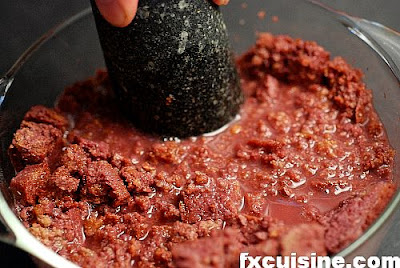Disclaimer: The following post was taken from a now defunct website, "fxcuisine." I have copy-and-pasted parts of the original post below for informational purposes. I do not take credit for any of the following text or photos.
Swiss mountain peasant dish to turn rock hard stale rye bread into a delicious dessert called sii.
Swiss mountain peasant dish to turn rock hard stale rye bread into a delicious dessert called sii.
Valaisian rye bread is one of the most typical and beloved food specialties of the Swiss canton of Valais, home of Zermatt and the Matterhorn. It is made from Alpine rye and wild yeasts and is a compact, slightly sour bread. Nowadays it is very much sought after by gourmets and usually eaten in very thin slices. But back in the days, Valaisian farmers like my grandma made this rye bread because rye was pretty much the only grain that would grow on the poor soil on Alpine fields. My grandma would harvest hers with a sickle, bring the grain to the village baker and have him bake her one month worth of bread. The bread was nice and relatively soft for the first week or so, but after that you had to chop it with an axe - no kidding. Although I had never eaten sii [see-ee] anywhere, not even at my grandma, it is very much a recipe to help make something good out of those beyond-staleness-dry breads. Much like Italian Zuppa, here we soak the bread in wine to soften it, then flavor it with winter-resistant ingredients until we get a hearty dessert to confort us through the cold winter. It is a traditional Valaisian recipe I've been wanting to make for more than 10 years.
Valaisian rye bread is made from 100% rye flour and contains no gluten. That certainly sounds nice if you are coeliac, but it also means that the bread won't rise and the dough is crumbly and breaks like a cake. Such is the fate of bread made from no-gluten grains. But the natural wild yeast used to somewhat leaven the bread give it a tartness not unlike regular sourdough. It is a very successful food specialty of Valais and I think it is promised to a great future, given its healthy slow-food appeal.
I confess never to have been faced with the need of using rock-hard rye bread, and bought a fresh bread from a guy who bakes them in fire oven and uses stone-ground flour. Quite the gourmet rye bread in fact. When I first tried this recipe last week somebody threw my bread in the bin after a few days, thinking that nobody in his right mind would have use for stale bread. I had to buy a new one and kept it under key (!) until it was dry, although not dry enough to require an axe to cut it.
Cut the bread in walnut sized pieces.
Put the bread in flat dish and cover with a strong red wine.
Pour in a generous glass of blackcurrant syrup. My grandma used to have a beautiful blackcurrant tree in her garden and always gave me some syrup. Now I buy it at the farmers' market from somebody else's grandma.
Add the drained raisins.
If you want to make the traditional sii, proceed to the next step. If you want to make gourmet sii, season like you would a gingerbread with ground nutmeg, pepper, cinammon, a hint of clove and dark honey. This dish is halfway between glühwein and gingerbread and can use the same spices.
Warm a tablespoon unsalted butter in a saucepan; add a laddleful of sii; and let it bubble and reduce over high heat.
When the sii starts to thicken like a custard, remove it with a large spoon and serve on an individual plate.
Add some Chantilly cream and serve. The alcohol will have evaporated but this makes for a hearty winter dessert or could be served with tea. A solid hot wine or liquid gingerbread. The Italians from Aosta have a similar recipe and you can probably do it with your local stale whole grain breads. Have a try, it is a great reminder of how much we have progressed and how people two generations ago had to find ingenious ways of recycling their stale breads in an attractive way!








1 comment:
Since posting this, fxcuisine seems to be back up and running! Check out the terrific site http://fxcuisine.com/Default.asp?language=2&Display=125&resolution=high
Post a Comment